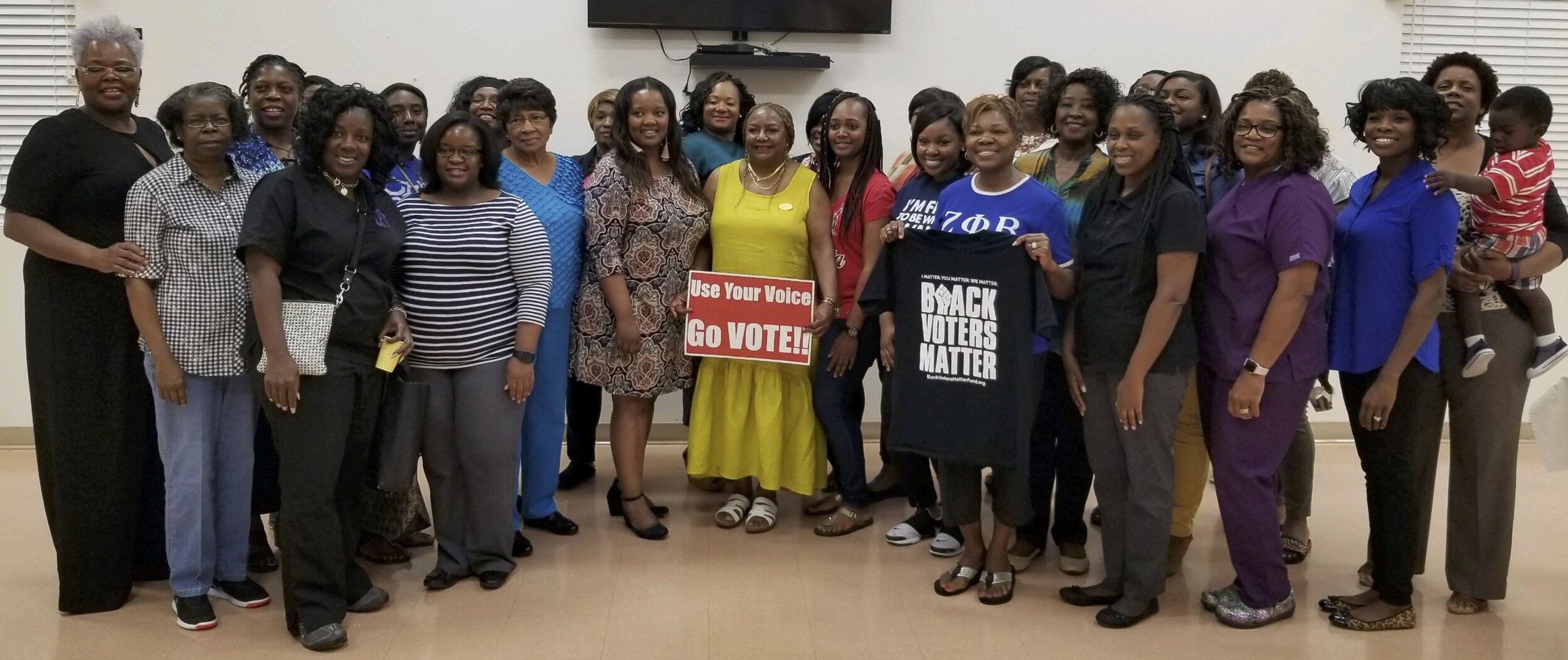On the final weekend before Georgia’s decisive dual runoff Senate elections, Debra McFadden-Bryant received a desperate call from a voter, but thankfully, McFadden-Bryant, a voter education, registration and turnout specialist, was prepared with an answer.
“She called to say she just got her ballot in the mail the last weekend and what could she do to vote at this point – because she still wanted to vote,” explained McFadden-Bryant. “It shows there are still people out there with ballots sitting on the kitchen table. So we tell them how to fill them out and where to drop them off, or how to get help to drop them off.”
It was an easy problem to handle for McFadden-Bryant, project coordinator for the non-partisan Sisters in Service of Southwest Georgia, a group serving 10 of the state’s most rural counties. Between now and 7 p.m. Tuesday (tomorrow), when the polls close in Georgia, there will be other potential problems, situations or circumstances to be dealt with.
“There are lots of feet on the ground,” she said. “We will be at it until the end.”
Formed in 2018 by four predominantly Black sororities, the Sisters cut their teeth as a unit during Stacey Abrams’ historic campaign, mobilizing and engaging voters in every aspect of their communities, be they business leaders, church elders, high school and college students, coaches, single parents, or you name it. Now they are at it again in rural Georgia for the showdown that will ultimately decide whether obstructionist GOP Leader Mitch McConnell continues his tyrannical reign over the chamber.
“These are counties where people usually get overlooked, not the big metro areas. They are spread out and they are generally small groups of individuals, but collectively they have made a significant difference historically in elections,” McFadden-Bryant said.
“We understand the culture in a Southern rural area, where relationships are more important than anything you could possibly put on television in advertising. When you’re someone they know, people are more prone to listening to what you’re saying or reading what you’re giving them,” she added.
The Sisters, naturally, are engaged in the conventional techniques for identifying and mining votes, like voter registration and absentee ballot allocation projects, phone banking, door knocking, texting and social media engagement. However, they also have had to be creative with the coronavirus looming and the Black community among the most at-risk by the threat posed by the pandemic.
The Sisters, for example, have made an all-out effort to leverage a multi-generational workforce for the campaign, targeting 19- to 35-year-olds to harvest new voters and help empower young people in rural Georgia to methodically engage and influence their peers through direct contact and social media.
“We have been doing more one on one engagement with people, helping folks who are first-time voters across all age groups. You would be surprised at how many people have not voted in their entire life because they could not make a connection between voting and their immediate needs on a day-to-day basis,” McFadden-Bryant said. “It’s all about empowerment — helping make the connection between the power of their vote and their everyday life. Millennials and Gen Z’s have been driving that.”
Another truly unique project involved forming slow-speed caravans of vehicles through neighborhoods with large QR (Quick Response) codes attached to cars by magnets. Once read by individuals’ phones, the QR codes took the potential voters directly to Georgia official website where they could register to vote online or request absentee ballots. Door-hanger kits, explaining registration and absentee ballot requests, also deploy QR codes, which, with additional data, present the ability to track a person right through when they vote.
“We were going through targeted neighborhoods in caravans and on foot, socially distancing, with everyone in PPE protective gear,” McFadden-Bryant detailed, unable to disguise the satisfaction she took in being part that inventive project. “People still want to see a real face, real body, a real person.”
Joining the Sisters, Left of Center is part of the same coalition of groups seeking to boost voter turnout. LOC co-founder Deb Kozikowski was blown away by McFadden-Bryant the first time she heard her speak during an early coalition organizing conference call.
"Debra is an innovative organizer with an infinite well of kindness and ferocity,” Kozikowski talked about McFadden-Bryant enthusiastically. “She is laser focused on the best possible outcome. I love working with her."
By day (and no doubt a lot nights and weekends), McFadden-Bryant is the Business Process Improvement Specialist for the City of Albany, Georgia, a job that requires intelligence, vision, innovation, high standards and the ability to reach out and make new partners. Along with her corporate experience, hers is a skill set that translates well into the world of voter enfranchisement.
“Debra McFadden-Bryant is on the front lines in Georgia with hours left to go," LOC Co-founder Mara Dolan declared after interviewing Debra on LOC’s radio podcast. "She is a savvy, powerful activist who knows what it takes to motivate and move voters.”
And that’s helpful good because The Sisters are on a mission. Their motto and hashtag it all: #NotDoneYet.
“We will work to empower people and we will continue to work to empower people, because we are not done yet,” McFadden-Bryant promised.“It’s about each person can absolutely influence someone else, and don’t think even the little that you do won’t have an effect.”
Written by guest contributor Ken Bazinet. Ken is a respected, longtime national political reporter and freelance writer based in rural Maryland.

